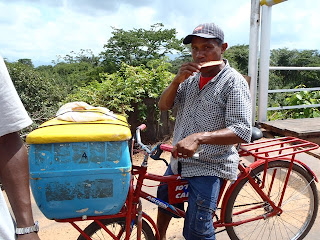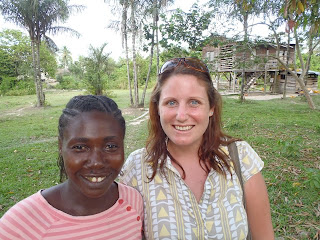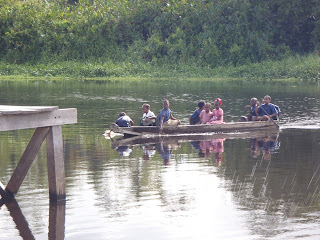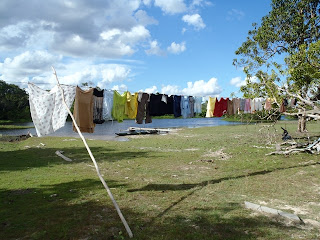 |
| These hurt when they bite! |
 |
| The peanut factory |
I have been supporting the Nursery schools over the past few months and went and did some workshops at their clusters and also helped to run a parent’s meetings. The nursery kids here are very cute as they wear uniforms just like the children at primary school, but they are always too big for them. Nursery education is quite good here and seems to be the most successful of the three.
Both myself and the teacher who will be taking on my role when I leave, have been carrying out observations of the teachers on the Professional Development Course. Overall I have been really impressed with what I have seen. They have taken onboard the ideas and activities from the course and put them into their classrooms. I gave examples of using drama for reading comprehension and it has been great to see the kids playing out different characters – sometimes a little too well -we watched a child acting to be a drunk! The teachers have assignments to carry out in both their classroom and clusters; they are getting more confident at presenting in front of others. Whilst the course is up-skilling them individually, a big part of it is training them to train others and to be a resource people for their schools and clusters.
We have also been into a few more schools and delivered the Jolly Phonics kit and provided training. As always it is so lovely to get in front of a class and teach the children. I often take the children outside or make the lesson really practical to show teachers ideas which move away from the blackboard (and talk and chalk). A big problem I find here is the noise, the schools tend to be one big room with the classrooms being made by dividing blackboards, there can be 200 children in one room, and as you can imagine the noise from the neighbouring classes can always be heard, you really have to raise your voice when you teach!
An area in my region I have not been to before is Bara Cara. It is 50 miles in on the Canje River and the only way to get there is by boat. There is a school there and the head teacher is one of my course students. We arranged to go and see her about 6 weeks ago. I tried to call the one village phone to confirm we were coming but it was broken so we took a chance and went anyway! Myself and a friend had walked to the stelling earlier that day and had seen a big boat full of water and joked that was my boat – hmm no joke, it was. When we arrived in the evening it was still full of water! The men spent a while bailing it out so it only had a tiny bit in the bottom. We set off at 11pm (just 2 hours late) and luckily could tie out hammocks from one side of the boat to the other. There were four of us on the trip, myself, another volunteer, my colleague and her husband. She had told me that she wanted him to come to look after us. I, in my independent way had told her there was no need for that, both myself and the other volunteer were experienced travellers but he was welcome to come along. Well I was quite glad that they did as we had a few bad experiences of some people on the boat wanting to rob us, charge us more for the passage and try to do something to the other volunteer whilst he was asleep. Luckily with my colleague and her husband those things were avoided. The journey was very pretty with thousand of stars shining above us and we saw several shooting stars, but it was a long journey and we didn’t arrive until 11 hours later! There was no toilet on the boat and needless to say we were all pretty desperate when we arrived! Bara Cara was started when the African slaves were given their freedom and could buy land to farm. Its main income is from farming both ground provisions plus marijuana! We were eyed with suspicion as we arrived but people did start to warm to us. Bara Cara has a population of 400 which is spread out on both sides of the river bank – the church is on one side and the school and medical centre on the other with houses on both. Everyone had a boat whether it is a dugout canoe or a motor boat. Even though there was very little at Bara Cara it was the hub for smaller villages up and down the river from it. We met the head teacher who arranged for us to stay in the medical centre and we slept on the hospital beds they had. We went to bathe in the water trying to decide whether to go for a swim as there were piranhas in the water, in the end the hot day got the better of us and we dived in! When we got back up to the medical centre a sick women had arrived from a nearby village so we cleared one of our beds whilst she lay on it hooked up to a drip but it was fine for us to still go in the room and get out things, all very surreal! Bara Cara has no electricity and no running water. Everyone gets their water from the creek for drinking, washing, cooking etc. Creek water is supposed to be ok to drink but we filtered ours just in case. We had to keep on going down to the river with buckets and fill them up with water for whatever we needed. We arrived on a Sunday and there was a cricket match being played so we went down to watch it. There was quite an aggressive feel to the village, a huge amount of rough-play between the children and then ‘sparing’ would break out between men and everyone would gather around to watch. With no electricity we went to bed pretty early – there were bats flying around but I felt safe under my mosquito net!
On Monday we got up and bathed again in the river, this time just on the edge using a calabash as a bowl to pour water over ourselves. We went to the school and watched the children arrive in their boats; all of them can swim and most can paddle a boat too. The morning we spent doing observations and demonstration lessons and in the afternoon the school took a half day so we could do training with the teachers. We looked at reading comprehension and differentiation. The teachers felt very de-motivated and that they, their school and probably the village as a whole had been forgotten, and they are probably right. They get very few official government visits and have to live quite a basic life. There was also not the sense of community that you often get in the Amerindian villages where they have set up a leader and a council. The teachers appreciated us coming but felt they had tried all our suggestions already and they hadn’t worked.
The journey home was suppose to be shorter as we had the same engine but a much smaller boat, but as we went 4 hours late we caught the tide coming in at the end of our journey (i.e. we were going against the tide) so it still took 7 hours. We actually got off the boat early and caught a car up as soon as we hit the road. It was a good thing we did as when out boat reached the main river the sugar boats were passing and it had to wait another 2 hours!
I turned American for the day and went and celebrated American Thanks giving. I was invited to go for dinner at one of the American embassy staffs houses. This house would have been posh back home, so it is uber posh here! I sat on carpet (not done for 10 months) sat on a comfy sofa, had ac, hot water came out of the taps, there was a dishwasher, and lots of wine! Was a very fun evening and nice to meet a new bunch of people.
Because of the elections myself and 3 other volunteers were moved from our regions all the way to Region 9. We travelled for 16 hours to get down there which is on the Guyana / Brazilian boarder. Where we live (in New Amsterdam) was identified as a hot spot and with only one road in and out they thought if anything did happen then it would be hard to reach us. We weren’t complaining, a week’s free holiday in the most beautiful part of the country!
I have been to Lethem once before for Easter when we went to the Rodeo. It was really nice to spend longer and see the place properly. The day of the elections was a national holiday so a big group of us set off in the heat of the day and walked for an hour to a beautiful creek, we were every glad when we reached there and jumped into the cold water straight away! There was a tree over-hanging the water so we climbed up it and jumped into the water (after watching the school children do it first!) Lethem is also a shopping hub for Brazilians. Goods are often imported from Brazil or from Georgetown and sold in big warehouses where Brazilians come across the boarder and shop as they don’t have to pay tax on them.
We went and visited some of the VSO projects going on in Lethem. One volunteer runs a wood workshop training locals in using the tools and woodwork skills. They had been working on a project where they made Special Needs equipment for the Rehabilitation department at the hospitals. They provide training whilst making the equipment and the trainees get paid for it. They also met the disabled children so built up relationships and decreased discrimination. We visited a Peanut butter cooperative where 5 or 6 women worked together to make Peanut butter, it has been running for a few years and is a successful project.
Another day we visited a volunteer in an Amerindian village about 16 miles outside Lethem called Moca-Moca. There we climbed up 1000 steep steps (in one place having to use a rope) to reach the top of a disused hydro-electric station (not in use any more due to a landslide). We climbed out onto the black rock and had stunning views of Lethem and into Brazil. When we reached the bottom we went for a swim in the Moca-moca waterfalls, again enjoying jumping in and off the rocks. We spent the rest of the day in the village eating the delicious food the volunteer prepared for us. Her project is to cultivate a garden growing different crops and introducing some natural pesticides for ants which are a huge problem here. She also has a pond in the garden and a target of Justin Bieber which you can shoot a bow at!
On a different day we visited the Kumu Falls, I went to these at Easter but they looked quite different due to the higher level of water. We had a lot of fun climbing up the rocks, sliding down them and swimming in and out of the pools. At the creek by the bottom there were 100s of butterflies that happily flew around you.
My host kindly took me across the boarder to Bon Fim (Brazil) on her motorbike. You are allowed into Brazil for 24 hours without having to stop at customs. I did feel very suspicious as we drove past the boarder police without stopping. It was a great way to see the landscape sitting on the back on a motorbike!
Coming back for New Amsterdam I decided to fly – the journey is about 22 hours on the way back (with a stop on the edge of the jungle as you cannot pass through until 4am) the one and half flight meant I got back not feeling quite so tired!
The elections were won by the current party the PPP, there was a lot of confusion around the results as they has to be recounted and there are still protests going on as there are claims on rigging. The PPP don’t have a majority in parliament so things are going to be different. There were some problems during the elections but most of it was small scale and everyone was kept safe.
Each month I work with a group of Fast Track learning educators who run a remedial programme after school. The programme is supposed to be coming to an end (still to be finally decided!!) so we knew our December meeting could be our last. The teachers organised a party with A LOT of food and made a presentation to me of a lovely gold chain. It was all quite emotional and gave me a little taste of what it is going to be like when I leave! The Learning Educators have worked so hard over the last year and have a really tough job to do. I have really enjoyed working with them.
So Christmas has finally hit Guyana. There is a lot of cleaning going on, each night after it gets cool people are scrubbing their walls and washing their furniture. Also people buy plastic flowers and put up new curtains. Christmas decorations are starting to go up including some plastic trees. The balconies are being decorated with balls and tinsel and lights. Our office looks great with lots of decorations. Here Santa exists but children don’t believe he is real, but he does play a big part in Christmas. People get presents on Christmas day, they eat Pepperpot which is meat (can be wild) in a sauce made from cassava. They would eat it with bread. They also eat black cake which is similar to the fruit cake we have a home. People will go to church on Christmas Eve and Old Years Day (New Years Eve) and then onto parties afterwards. There is a lot of going from one house to the next.
I went to a Nursery Christmas Concert this week. The children sang Christmas songs and said poems. There were also Christmas skits by the parents and staff. They were every different to ones done back home but the best thing was the audience reaction to them – people know how to laugh here and it is very infectious!
I am off to Panama for Christmas to meet up with my Family. I hope you all have a great holiday and super Christmas!
 |
| The Kanuku Mountains |
 |
| Butterflies |
 |
| New Amsterdam |
 |
| Who can think of a caption!? |
 |
| The boat |
 |
| The hospital |
 |
| Arriving at school |
 |
| Pulling a boat out of the water |
 |
| Lethem |
 |
| Selling ice cream |
 |
| Standing frame |
 |
| Guess what this is!? |
 |
| Amerindian house |

















